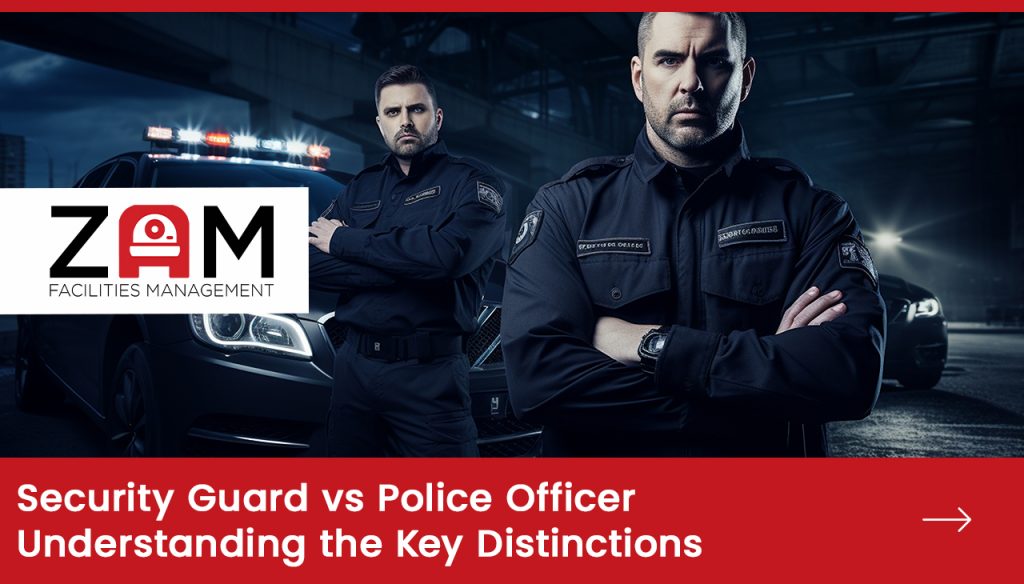In the dynamic world of public safety and security, the roles of security guards and police officers are often misunderstood. While both professions share the common goal of maintaining order and ensuring the well-being of individuals and property, there are significant differences in their responsibilities, authority, and training. In this blog post, we’ll explore the key distinctions between security guards and police officers, shedding light on their respective roles and the vital functions they serve in society.
Blog Outline
ToggleThe Scope of Responsibilities
Security guards are employed by private companies or organizations to safeguard their premises, assets, and personnel. Their primary responsibilities revolve around monitoring and controlling access to designated areas, deterring criminal activity, and responding to potential threats or disturbances. They act as the first line of defense, providing a visible presence and taking proactive measures to prevent incidents from occurring.
Police officers, on the other hand, are sworn law enforcement officials employed by government agencies. Their responsibilities extend far beyond the confines of a single property or organization. They are tasked with upholding the law, maintaining public order, and protecting the safety of citizens within their jurisdiction. Police officers have the authority to investigate crimes, make arrests, and respond to emergencies that threaten the well-being of the community.
Legal Authority and Powers
One of the most significant Differences Between security guards vs police officers lies in their legal authority and the powers bestowed upon them. Police officers are vested with the legal authority to enforce laws, make arrests, and use reasonable force when necessary. They undergo extensive training in areas such as criminal law, investigative techniques, and the use of force, equipping them with the knowledge and skills to carry out their duties effectively.
In contrast, security guards do not possess the same legal powers as police officers. Their authority is typically limited to the premises they are hired to protect, and their actions are governed by the guidelines set forth by their employer and local laws. While they may have the authority to detain individuals for a reasonable amount of time, they cannot make arrests or use force beyond what is necessary for self-defense or the protection of others.
Training and Qualifications
The level of training and qualifications required for security guards and police officers differs significantly. Police officers undergo rigorous training at police academies, where they receive comprehensive instruction in areas such as criminal law, firearms handling, defensive tactics, and investigative procedures. This extensive training prepares them to handle a wide range of situations and ensures they are well-equipped to uphold the law and protect the public.
Security guards, on the other hand, typically receive less extensive training, which varies depending on the requirements of their employer and local regulations. Their training often focuses on areas such as security procedures, emergency response, and customer service. While some security guard positions may require additional specialized training, the overall level of training is generally less comprehensive than that of police officers.
Public Perception and Trust
Another significant difference between security guards and police officers lies in public perception and trust. Police officers are seen as representatives of the law, and their authority is widely recognized by the public. They are trusted to uphold the law impartially and to protect the rights and safety of citizens.
Security guards, however, may be perceived as private employees whose primary responsibility is to protect the interests of their employer. While they play an essential role in maintaining safety and security, they may not always be viewed with the same level of authority and trust as police officers.
Conclusion
While security guards and police officers share the common goal of ensuring public safety, their roles and responsibilities are distinct. Police officers are sworn law enforcement officials with the legal authority to enforce laws and make arrests, while security guards are private employees tasked with protecting property and assets. Understanding these differences is crucial for fostering a collaborative and effective relationship between these two professions, ultimately contributing to a safer and more secure society.
ZAM FM Ltd
At ZAM FM Ltd, we take pride in providing top-notch security services to our clients across the UK. Our exceptionally prepared and experienced security guards are devoted to guaranteeing the wellbeing and assurance of your premises, resources, and staff. With a solid obligation to incredible skill and honesty, we endeavor to keep up with the best expectations
Frequently Asked Questions (FAQs)
Can security guards make arrests?
Safety officers don’t have the lawful power to make captures in the UK. Nonetheless, in specific conditions, they might be allowed to keep people for a sensible measure of time until policing.
Are security guards allowed to carry firearms?
In the UK, security guards are generally not permitted to carry firearms. However, there are exceptions for specific high-risk environments, such as cash-in-transit operations, where specialized training and licensing are required.
How do the training requirements for security guards and police officers differ in the UK?
Cops in the UK go through broad preparation at police foundations, covering regions, for example, criminal regulation, guns dealing with, cautious strategies, and analytical techniques. Security guards typically receive less comprehensive training, focusing on security procedures, emergency response, and customer service, as per their employer’s requirements and local regulations.
Can security guards use force?
In the UK, security guards are generally permitted to use reasonable force in self-defense or to protect others from harm. However, the use of force must be proportional to the threat and in compliance with local laws and their employer’s policies.
What is the role of security guards in emergency situations in the UK?
In emergency situations, security guards play a crucial role in initiating emergency response protocols, securing the premises, and assisting with evacuation procedures. They may also be responsible for coordinating with emergency responders, such as the police and fire department, to ensure a swift and effective response.
